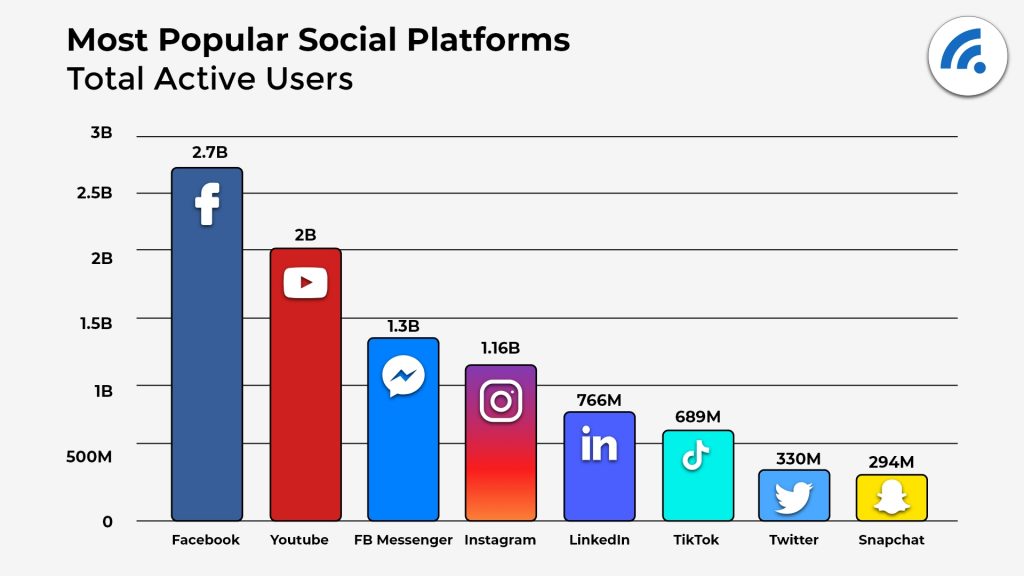Online platforms have become the primary method for property developers and real estate agents to market their properties. In fact, according to a study from the National Association of Realtors, 77% of real estate agents use social media for real estate in some way, shape or form.
#1 Set up your social media
Let’s start off with a fun fact: 99% of millennials (and 90% of baby boomers) begin their home search online. Chances are you already have some personal social media accounts, but which platforms deserve the majority of your focus to promote your real estate listings? A lot depends on your audience. Facebook, Instagram, LinkedIn, TikTok, Twitter all have different demographics. For example, if you’re selling commercial real estate, consider connecting with entrepreneurs, successful professionals and industry organizations on LinkedIn. If your target market is first-time buyers or young adults, Instagram is a good choice as the majority of users are between the ages of 18 and 34. Instagram users are visually-oriented, meaning high-quality property photos and videos are bound to perform well. YouTube is ideal for real estate professionals who provide training or courses, but can be also leveraged by agents who are not afraid to be in front of the camera to share their expertise.

#2 Post consistently and strategically
One of the most important “rules” of social media is to post consistently in order to remain top of mind. In terms of real estate marketing ideas, it’s important to have a diverse content calendar that aligns with your personal branding and real estate business. Eye-popping photos coupled with details and contact information encourage “likes” and shares, and also compel visitors to get in touch with you. However, if you do not have the time or creativity to make or schedule posts, it is sufficient to have a fixed day/time when you upload something to share to your followers. For example, take plenty of photos and videos every time you visit a new location or get a new listing, and make it a point to post every Tuesday and Sunday. Add to that some impromptu uploads of viewings, location recommendations, and other property-related information, you’ll be able to keep your visitors updated and
#3 Start conversations to generate leads
However, just posting content on social media may not be enough to help you gain leads. A good way to interact with people who are interested in real estate is to join relevant groups, where you’ll not only get an idea of what’s happening, but also join and contribute to conversations. The vast majority of potential buyers and/renters are searching for information, which means they have questions that you could answer. Instead of just posting endless promotional content (a one-way broadcast), you open up two-way conversations which makes you valuable to the discussion, helps build credibility, and a positive experience in the mind of a potential client.
#4 Incorporate storytelling
Just like when having a conversation with friends, include some interesting information when promoting your properties. For example, when doing a live video at a certain location, you can include recent real estate news, your personal experiences, observations, or recommendations about the surrounding area. Such additional information will show potential clients your familiarity with the location, and will make them more likely to contact your for more information. Similarly, when posting to social media, include short stories or anecdotes to attract interest and generate conversation around your post. You could even get satisfied clients to do a short testimonial video about their positive experience working with you.
#5 Personal on-brand visuals
For the more tech-savvy, maintaining a personal branding theme is key to good digital marketing. As mentioned before in one of our previous Estate123 webinars, creating your personal brand helps you make a good impression on potential clients, increases your credibility, and leads to more exposure of yourself and the properties you are advertising. Make sure that your information and personal profile sections on any given social channel are 100% complete with your name, agency, email address and/or contact number, website, and registered agent number. To increase the visual impact of your postings, you can even add a photo of yourself in property listing images to increase the impression of accountability, credibility, and trust, as people will be able to place a face to the name on your listings, and know who they are dealing with.






